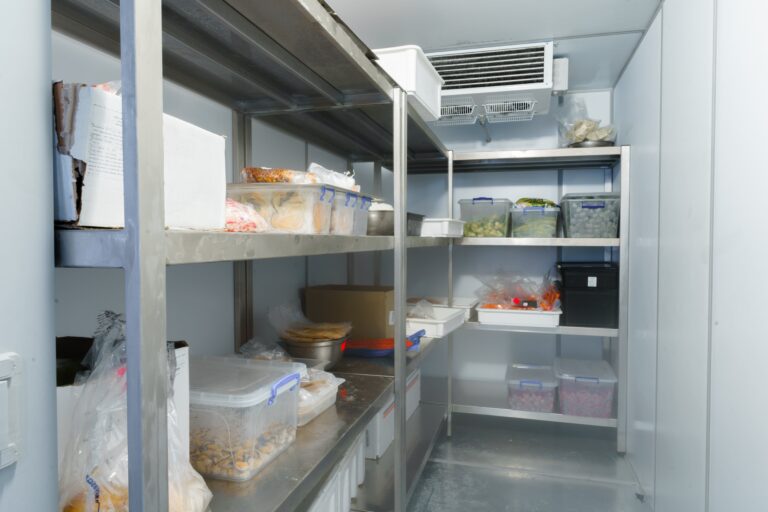To make this measure more effective and tailored to the specific context of your company, we recommend that you first perform an overall analysis of your energy situation.
Keeping your company’s cold rooms running smoothly
In food production and related sectors such as catering, sales and gastronomy, respect of the cold chain is essential. Cold rooms are essential for establishments handling large quantities of food. The electricity consumption of this equipment is very high, especially during the summer months. It is therefore crucial to optimise its use.
The approach described below helps to optimise the use of the system.
Definition of requirements with a view to optimising the use of cold rooms
Analysis of current energy consumption
In the case of high consumption, it is essential to determine the consumption profile. Temporary or permanent installation of measurement points is recommended.
Analysis of cold room management
- Assessment of cold room use, e.g. temperature setting, loading frequency, frequency of defrosting of indoor unit
- Identify potential incorrect operating modes, e.g. too many starts, defrost frequency too high, etc.
Visual check of the installation
- Visual inspection of the entire periphery of the installation, including pipework, insulation and indoor and outdoor units.
Further information
H4 The main tasks of an engineering office (technical consultant) or a qualified craftsman (refrigeration installer) in optimising cold rooms are as follows:
- Carry out an in-depth inventory of the infrastructure (possible co-financing)
- Analyse electricity consumption
- Carry out professional checks on the operation of cold rooms
Implementation of cold room optimisation measures
Adapting operations to comply with good hygiene practice
- Adjust the temperature to specific needs
- Optimise operating periods, e.g. by temporarily adjusting set points and programming shutdown periods
- Optimise defrosting of the indoor unit, e.g. by keeping defrosting periods to a minimum and using an intelligent defrosting system.
- Interruption of indoor unit operation during loading phases.
- Automatic light cut-out in cold rooms.
Raising employee awareness
- Train staff to use cold rooms correctly
- Make sure that cold rooms are filled in the right way, e.g. avoid storing hot goods and blocking the coolers
Maintenance and periodic inspection
- Have maintenance and checks carried out by a qualified professional (refrigeration installer)
- Regular cleaning of external condensers
Further information
H4 Checking the possibility of using waste heat with an engineering office (technical consultant)
- Electric compressors release waste heat. This heat can be used for other energy purposes, such as pre-heating domestic hot water, heating production halls, drying materials, etc.
Subsidy application
Aides étatiques
Attention : effet incitatif à respecter pour la demande d’aides (étatiques ou non) et sous réserve de remplir les conditions d’éligibilité.
To respect the “incentive effect”, no binding commitment (signing a quotation; paying a deposit) may be made BEFORE submitting the application file or receiving the agreement in principle from the State or the electricity and natural gas supplier following a subsidy application.
Fit 4 Sustainability” programme:
- The “Fit 4 Sustainability” programme provides co-financing for an environmental audit and action plan on one or more topics chosen by the company (energy, greenhouse gases, waste, water, etc.)
- Subsidy of up to 50 %, 60 % and 70 % of the fees for carrying out an environmental study (energy audit and/or carbon footprint) + detailed, costed action plan to reduce consumption/GHGs (greenhouse gases) (medium- and long-term investment, ROI, etc.) – open to SMEs and large companies (except those required to carry out a statutory audit)
- Any questions? Luxinnovation
- Financial Aid for small and medium-sized enterprises covering up to 70% of eligible costs for the implementation of a project aimed at reducing the environmental impact. The eligible project budget must be in a range from 3.000 € to 25.000 € excl. VAT.
- For more information:
- Chambre des Métiers for craft companies
- Chamber of Commerce for businesses in the non-craft sectors
Implementation aid
- ITM SST 1314.2 Installations de production de froid (Cold production system using carbon dioxide (CO2) (R744))
- ITM-CL 318.2 Tuyauteries métalliques destinées au transport de (Metal piping for the transport of fluids within a company)
- ITM-SST 1305.1 Appareils sous pression fixes contenant de l’air comprimé (Fixed pressure vessels containing compressed air or liquefied, compressed or dissolved gases with CE marking)
